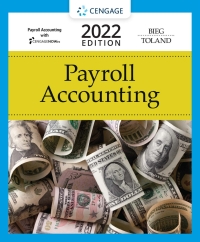Problem 8-33 Cash Budgeting (L04) 2. Total cash disburgements Mary and Kay, Inc., a distributor of cosmetics, is in the process of assembling a cash budget for the first in February: $121,000 quarter of 20x2. The following information has been extracted from the company's accounting records: All sales are on account. Sixty percent of customer accounts are collected in the month of sale: 35 percent are collected in the following month. Uncollectables amounting to 5 percent of sales are anticipated, and management believes that only 20 percent of the accounts outstanding on December 31, 20x0, will be recovered and that the recovery will be in January 20x1. Seventy percent of the merchandise purchases are paid for in the month of purchase; the remaining 30 percent are paid for in the month after acquisition The December 31, 2020, balance sheer disclosed the following selected figures: cash, $20,000; accounts receivable, 555,000; and accounts payable. $22.000 Mary and Kay. Inc. maintains a $20,000 minimum cash balance at all times. Financing is available (and retired) in $1,000 multiples at an 8 percent interest rate, with borrowings taking place at the beginning of the month and repayments occurring at the end of the month. Interest is paid at the time of repaying principal and computed on the portion of principal repaid at that time. Additional data: January February Sales revenue $150.000 $180,000 $185,000 Merchandise purchases 90,000 100,000 140.000 Cash operating costs 31.000 24,000 45.000 Proceeds from sale of equipment 5.000 March 344 Chapter 8 Profit Planning and Activity-Based Budgeting Required: 1. Prepare a schedule that discloses the firm's total cash collections for January through March. 2. Prepare a schedule that discloses the firm's total cash disbursements for January through March. 3. Prepare a schedule thar discloses the firm's cash needs, if any, for January through March. The schedule should present the following information in the order cited: beginning cash balance, total receipts (from requirement [1]), total payments (from requirement [2]), the cash excess deficiency) before financing, borrowing needed to maintain minimum balance, loan principal sepaid, loan interest paid, and ending cash balance







